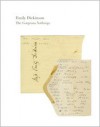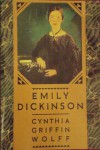Currently reading
Saints in Art
The Gorgeous Nothings: Emily Dickinson's Envelope Poems
Selected Poems
Emily Dickinson
Lies My Teacher Told Me : Everything Your American History Textbook Got Wrong
Gone with the Wind
The Good Terrorist
 After the Boston Marathon bombing, I had to reread this book. Everything I could say about it within that context -- that it shows the danger of "the cause" trumping morality; that terrorists are frightening not because they're monsters but because they aren't -- sounds trite and obvious. So I won't focus on those points, other than to say that yes, Doris Lessing does them full justice without being the least bit hamhanded.
After the Boston Marathon bombing, I had to reread this book. Everything I could say about it within that context -- that it shows the danger of "the cause" trumping morality; that terrorists are frightening not because they're monsters but because they aren't -- sounds trite and obvious. So I won't focus on those points, other than to say that yes, Doris Lessing does them full justice without being the least bit hamhanded.Many of the Goodreads reviews of this book have mentioned how difficult it is to enjoy a book whose characters are so unlikable. Lessing reminds me in that respect of Shirley Jackson's early novel The Road Through The Wall. The difference is that Jackson's work is peopled with dozens of characters, every one of whom is at least off-putting and many of whom are positively repulsive. By the end of the book, the reader is forced to wonder what the point was either of reading or writing that book.
The Good Terrorist, on the other hand, is populated by weak and often annoying characters; but many are sympathetic in spite of their flaws, and seem bewildered to find themselves in this story.
We readers share their bafflement. What could Alice Mellings' parents have done that could possibly be seen as turning their daughter into the title character? Her father and mother are ordinary in many ways, interesting in others.
Her mother, Dorothy, is to me the most compelling character. She alone is utterly clear-eyed. Like many women of her generation, she realizes too late that the ordinary choices she made -- not going on to university, marrying very young -- doomed her to a life she's determined her own daughter won't repeat.
But Alice refuses to learn the lessons her mother struggles to teach her. She goes to university but refuses to look for work. Choosing instead to be a perpetual child, she lives a mangled copy of her mother's life.
Some of Dorothy's insights are disturbingly appropriate to current American political discourse. In a quarrel with a lifelong friend, she says:
"Do you realize I have to think twice before I invite you here? You can't be invited with anyone who has a different political opinion on anything, because you start calling them fascists! You won't meet anyone, even, who reads a right-wing newspaper. You've become a dreary bigot, Zoe, do you know that?"
And later in that conversation come this observation, which I'm terrified may be true:
"People go on [demonstrations] because they get a kick out of it. Like picnics. ...No one bothers to ask any longer if it achieves anything, going on marches or demos. They talk about how they feel. That's what they care about. It's for kicks. It's for fun. ...All you people, marching up and down and waving banners and singing pathetic little songs -- 'All You Need Is Love' -- you are just a joke. To the people who really run this world, you are a joke. They watch you at it and think: Good, that's keeping them busy."
Her friend accuses her of wanting to "smash things up." She means that Dorothy wants "to break with all your friends;" but I think Alice, who overheard this entire conversation, takes this idea quite literally. Dorothy has recently told Alice that Dorothy wasted her life cooking for people (family, friends) and is glad she doesn't have to anymore. Alice, who has spent most of the book making "wholesome" food for her "comrades," never makes another pot of soup. She refuses to stay at home preparing food for the returning hungry warriors, and instead insists on accompanying her friends to a bombing that is as senseless as it is destructive.
This brilliant book is a difficult read. Many other reviewers have pointed out that for a story about terrorism, it's surprisingly slow-moving and low on action. Which is true until the very end. Nothing happens and nothing happens and then everything happens.
But don't be misled by the stretches of seeming calm. Every word, every scene, every conversation is there for a reason. Lessing is too great a writer to waste our time with unnecessary words.








